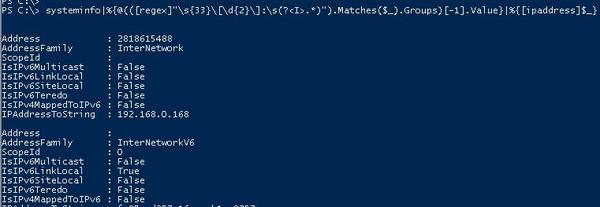When I work in a command prompt, I’m used to start a new window by just typing ‘start’.
Unfortunately, it doesn’t work in a Powershell prompt as start is defined as the alias of the Start-Process cmdlet.
Get-Alias -Name Start

I was about to use the suggested one-liners that you can find on the following page:
http://stackoverflow.com/questions/15667322/how-to-open-powershell-console-window-from-powershell
Invoke-Item C:\Windows\System32\WindowsPowerShell\v1.0\powershell.exe # or start-process powershell
..But it doesn’t meet my needs perfectly.
I wrote for fun the following function that has also some limitations:
- It’s unable to take in account the MTA (multithreaded apartment) mode vs. STA (single-threaded apartment. It always launches in STA and issues a warning if your parent window was in MTA.
- It doesn’t use the console file and modules that were previously used that start the parent shell
- It doesn’t use the arguments that were previously used that start the parent shell
- Idem for the version of Powershell, the working directory, …
But it has the following advantages:
- It takes into account whether it’s the ISE or the console, whether it’s a 32bit or a 64bit process
- It keeps the default colors
- It’s run under the same account and privileges
In other words, it just starts a new window as if you clicked on its shortcut in the start menu.
#Requires -Version 2.0
Function New-PSWindow {
[cmdletBinding()]
Param()
Begin {
# Is it a 32bit process
$is32Bit = ([IntPtr]::size -eq 4)
# Is it the ISE
$isISE = (Get-Process -id $PID).ProcessName -match '_ise$'
Switch -Regex ([Environment]::OSVersion.Version) {
"^6\.1" {
# Windows 7
$FilePath = 'C:\Programdata\Microsoft\Windows\Start Menu\Programs\Accessories\Windows PowerShell';
break;
}
"^6\.(2|3)" {
# Windows 8 and 8.1
$FilePath = 'C:\ProgramData\Microsoft\Windows\Start Menu\Programs\System Tools'
break;
}
default {
$FilePath = $false
}
} # end of switch
}
Process {
if ($FilePath) {
# Define a string based on architecture
if ($is32Bit) {
$32BitPathStr = ' (x86)'
} else {
$32BitPathStr = [string]::Empty
}
# Define a string based on the type of host
if ($isISE) {
$ISEPathStr = ' ISE'
} else {
$ISEPathStr = [string]::Empty
}
try {
# Launch the appropriate shortcut
$nshl = Join-Path -Path (Resolve-Path -Path $FilePath -ErrorAction Stop) -ChildPath ("Windows Powershell",$ISEPathStr,$32BitPathStr,".lnk" -join "")
if ($host.Runspace.ApartmentState -ne 'STA') {
Write-Warning -Message "The new PS Window is not opened in MTA mode but in STA mode"
}
Invoke-Item -Path $nshl -ErrorAction Stop
} catch {
Write-Warning -Message "Failed to launch new PS Windows because $($_.Exception.Message)"
}
} else {
$Msg = "Invalid OS: runs only on Windows 7/8/8.1 or 2008R2/2012/2012R2"
throw (New-Object System.Exception -ArgumentList $Msg)
}
}
} # end of function
I propose nps as alias for this function:
Set-Alias -Name nps -Value New-PSWindow
Have fun 😎

